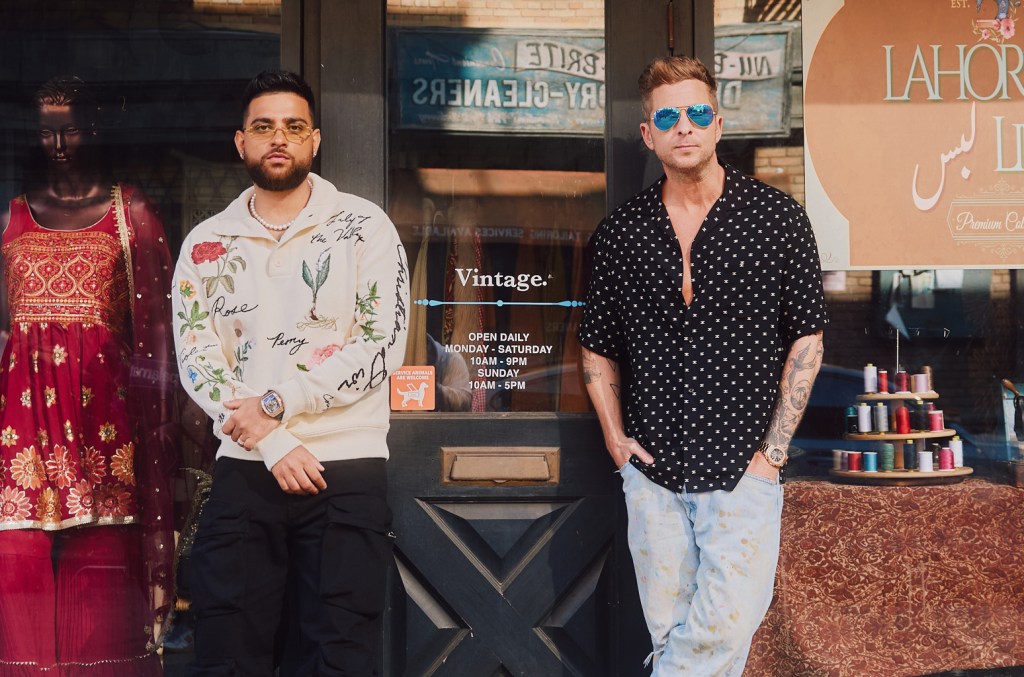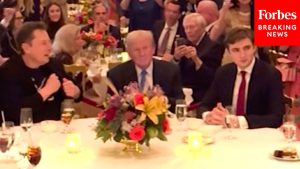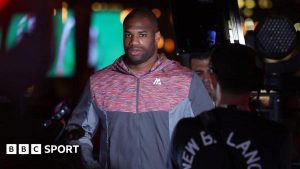Six months ago, Ryan Tedder experienced a fortuitous full-circle moment.
His longtime friend, Grammy-nominated songwriter and producer Savan Kotecha, texted him about an artist he thought Tedder should be aware of: pioneering Punjabi artist Karan Aujla. “He sends me a link and I was like, ‘Yeah, I already know who this guy is,’” recalls Tedder today, sitting in his West Hollywood home studio.
While performing with OneRepublic at the second edition of Lollapalooza India in January 2024, Tedder was asking locals and the band’s promoter “who’s popping” in India. They all mentioned Karan. “I went and listened to the music and I was like, ‘Oh, this is super tight. This is different,’” he says, explaining Punjabi as an Indian language that is emerging as its own subgenre and growing rapidly both locally and globally. At the time, Tedder mentally bookmarked Karan and carried on – until Kotecha came along and filled the gap.
Explore
See latest videos, charts and news
See latest videos, charts and news
Kotecha introduced Tedder to Karan’s friend and producer, Ikky, “and that’s where the whole thing connected,” says Tedder. The two met in L.A. and Ikky played Tedder in-progress tracks, including one that was called “Dassde” at the time. “I was like, ‘Oh, this is crazy.’ I asked him what the phrase meant, and he said it means ‘tell me.’ I wish all sessions went that quick.”
“Before this collaboration, Ikky and I always used to talk about how we wanted to do something out here with our music,” says Karan, 28, who is seated next to Tedder while on a quick trip to Los Angeles to shoot the song’s music video. “And then he had mentioned you guys were talking and I thought he was just kidding. Like, it’s not gonna happen. And then I remember being on tour Ikky sends me a rough draft and the first thing I hear is [Ryan] singing. And then it’s me jumping in with my Punjabi verse. And I was like, ‘Oh shit, it’s a Punjabi-English track.’ I was so excited at that point.”
And now, on Wednesday (Feb. 19), their historic collaboration finally arrives, marking both OneRepublic and Karan’s first English-Punjabi collaboration. The song’s music video, starring Indian actress Disha Patani, is out the same day.
“Sometimes,” Karan continues, “we feel like we manifested doing this with you, Ryan.”
You two just met in person for the first time – what brought you together?
Ryan: We were supposed to shoot the video, [when we] had enough of a finished version [of the song]. We just got back from Asia – we were in China and Vietnam and Japan and Korea, and we started in Bangkok for a few days. [Karan] wrapped his tour in India doing this massive sold out tour. And we were originally going to shoot the video in Little India, in Bangkok, and he got sick. It was the end of the tour. We punted and so we just now shot it this week.
Karan, you moved to Canada in your late teens. When did you become aware of OneRepublic as a music fan?
Karan: When I heard [hums “I Ain’t Worried”]. Ikky told me, because obviously I’m born in Punjab and I wasn’t aware of how the music worked out here. So, I came to Canada, met Ikky back in the days but before this collaboration me and Ikky always used to talk about how we wanted to do something out here with our music. But just being in Canada, that’s how I heard there’s this band called OneRepublic.
It only took six months for this song to arrive from the time Savan connected you, Ryan, with Ikky. Tell me about that timeline.
Ryan: Initially, we were racing: “Can we get it out in November, December?” I was like, what are we thinking? It’s Christmas. It’s a death trap, you’re gonna get smashed by Mariah [Carey], you’re gonna get smashed by Ariana [Grande], and just all the other stuff. So then we punted to February, which I’m really happy about because we’re going to be back in Asia a couple of times this year and India is going to be part of that. So the time is perfect and this is one of those where it’s like, I didn’t expect to love a bilingual record as much as this. I’ve probably listened to this demo more than anything, honestly, because it just feels good. And I think we’re even talking about doing an English language version as well. Most of our fans don’t speak Punjab.
Karan, why do you think Punjabi music is up next and, thanks to OneRepublic, catching on in the States?
Karan: I feel like people are more open now, even artists, to new languages, working with people, creating new ideas and it just helps artists like me to bring what they have [to] the table. This is the time for artists like me to actually experiment. My main thing is I just want to make the first Punjabi record that goes everywhere. My Spotify wasn’t like this always. It’s just happening over the last three-four years [of gradual growth]. We can see it happening in front of our eyes; if people want it, why don’t we just serve them what they want? Like, people in India want English on Indian records. They love these collaborations. They love when I’m singing in Hindi or Punjabi and then a verse in English comes. Even some rappers from India are rapping in English and Hindi. People are already into it. And we just need to do it more in a proper way.
Ryan: And one of the main reasons Punjabi music has exploded, including in cities and regions of India – because Punjabi is from the north – like Bombay, where five years ago, nobody knew what Punjabi music was…
Karan: They didn’t want to hear it, honestly.
Ryan: He’s the reason. Honestly, he’s one of the main reasons that Punjabi music has exploded. He was the right person at the right time. Anyone who’s not paying attention to India or Southeast Asia right now, on a cultural tip, is asleep at the wheel.
Karan: Our first thing was to actually take Punjabi all over India. And now, a few songs have blown up in India. And now this song is for the States or any place where they don’t care what language it’s in, it’s just a good song. And that’s all we’re trying to do here, man, and hopefully it’s going to work.
Ryan: Teach people some Punjabi too.
Karan: If Ryan understands it… it’s not that hard. Yesterday we made some content for social media and he’s speaking Punjabi fluently. Hopefully, in our next song, I’ll be singing a verse in English and you’ll be singing a verse in Punjabi.
What are the key production elements of a Punjabi song?
Ryan: In this record there was a learning curve for me. I’ve obviously heard Punjabi music and Hindi music, and musically there’s a lot of similarities in Punjabi and Hindi. The language is different, obviously. But you’re using a tabla. There’s hand drums that are being used, some of which exist in the States, some of which don’t. One of my favorite sections of the whole record Ikky did, which is a drum break in the bridge that’s just a jam, it’s just a dance moment. It’s so festive and full of life and it’s layers of tabla and Indian hand drums and Punjabi instruments. The only time I’ve ever used any of that was if I’m doing Timbaland style hip-hop stuff because he leaned heavy into East Indian and Punjabi instruments. It’s not a mandolin. It sounds like a mandolin to us, but it’s basically an Indian version of a mandolin that’s a key element throughout the whole song. We’re not using a sitar or anything like that, it’s a little too shtick. And then the cadence, it’s all swung. If you think about it, all their music is played by hand. So I used all live kicks when I did the drums. It’s weird to reference, but I was thinking of stuff from like, 10-12 years ago. I didn’t want it to feel too modern. I love Sabrina Carpenter, but we’re not making “Espresso.” It’s a different style. So I had to lean into the cadence of what his verses were and Ikky helped a ton because I was like, “I’m not going to be the white idiot that steps foot into a culture and misappropriates it.” It has to be exact.
Karan: And the way you did it, it doesn’t sound forced. It’s one of my favorite tracks that I’ve ever worked on.
Tell me about filming the music video together with the band.
Karan: It’s like a story of our concert that’s [hopefully] happening in the future, in India…
Ryan: That’s really what it is.
Karan: It was two days [of filming] in a row. Kind of tiring, but we made a lot of memories there. I’ll remember that for the rest of my life.
Ryan: We were in a Hollywood backlot, which was pretty cool. I mean, from my perspective, I was like, this is a Bollywood video. There’s big time elements of Bollywood happening on camera.
Karan: It’s a mix.
What are your hopes for the song and video once they arrive?
Karan: Honestly, this is just the beginning and I’m just happy that we have this relationship now. I feel this big brother vibe from Ryan and I know if I need some guidance in the future…
Ryan: Just text.
Next summer, the goal is I want to go [to India] and be in a taxi cab or a Tuk Tuk and I want to hear this playing somewhere in the streets.
I’ve had things like this happen once in a blue moon. Everything happened so effortlessly and so seamlessly, including even now, the video getting cancelled and coming together and [getting] Disha who’s massive and just crushed it. All of those things threaded the needle for a multicultural record like this, it’s so exciting. I know people are going to love it.








